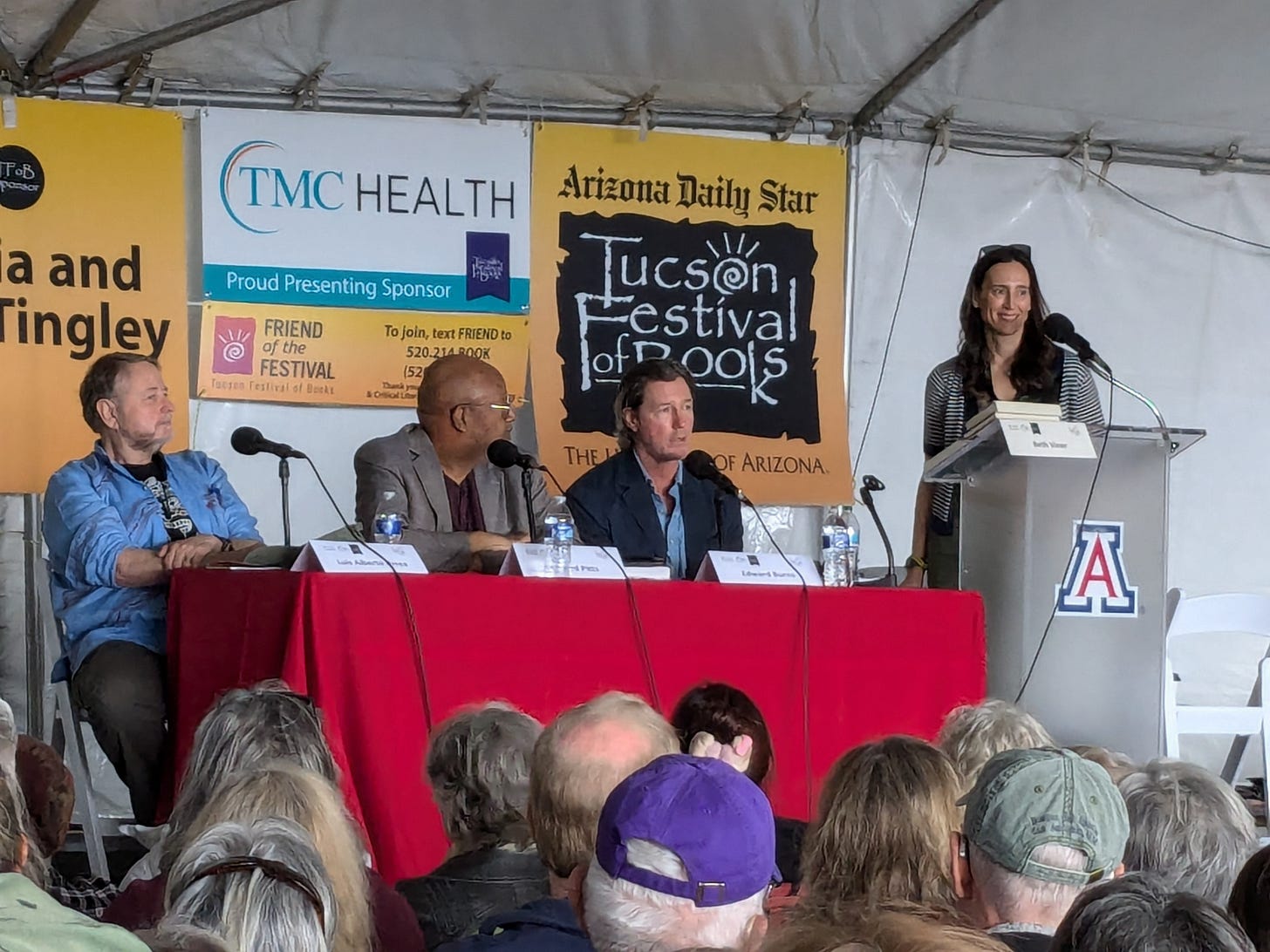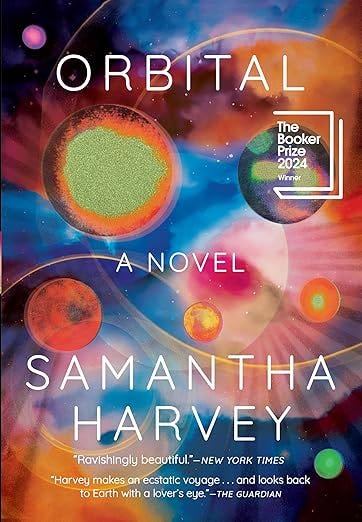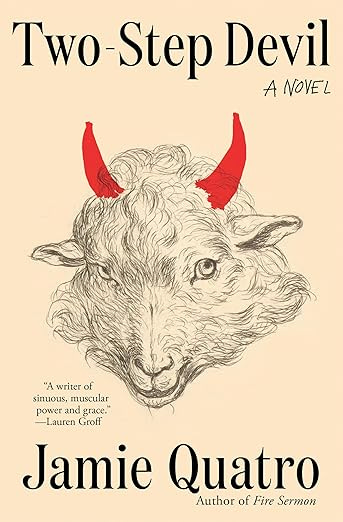Politics, Literature, and a Book Festival
Gretchen Whitmer in 2028? When is a novel not just a novel? And early influences on future literary stars.
Sorry for the paucity of posts in the last couple weeks. Just had a lot going on, particularly with kids home on spring break. But I did manage to get to a book festival and, along with signing copies of my book that were on sale at the University of Nebraska Press booth, I enjoyed attending a half-dozen events and discussions with various authors, including one potential future presidential candidate. Some notes from the festival …
Who doesn’t love a book festival? I was happy to spend two days recently at the Tucson Festival of Books, with the only hard part being the decisions over which author talks and panel discussions to attend. I made it to six events — three on politics, two on novels, and one on architecture and Frank Lloyd Wright.
Here are three thoughts to ponder from that medley of events.
1. Gretchen Whitmer in 2028?
Could Michigan Governor Gretchen Whitmer be the Democratic presidential candidate in 2028?
Maaaybe?
I think she has two potentially significant hurdles in front of her if she’s considering a run. First, I have a feeling the party may be gun shy about nominating another woman after two losses by Hillary Clinton and Kamala Harris in the last three elections. Second, I don’t know if Dems will go for a more traditional candidate, as one would typically expect, or if Donald Trump has changed politics so much that primary voters will shift further to the left in reaction.
But Whitmer is surely one of the top 10 possibilities to win the nomination if you’re ranking them today, and probably in the top five.
My opinion has been that Whitmer would have considerable appeal in a certain type of contest. That is, in a race where voters are looking for a down to earth, pragmatic candidate. (And, of course, if they want to try once again to make history with a female nominee.) That opinion that was reinforced after seeing her speak at the book festival, where she was promoting her 2024 book, True Gretch.

Whitmer doesn’t particularly strike me as someone who spends a lot of time thinking about how her vision fits into the history of American politics (i.e., Barack Obama or Bill Clinton). She also doesn’t come across as someone who wants to lead a left wing movement (Bernie Sanders, AOC).
But here’s where Whitmer shines:
One, the sense that she wants to roll up her sleeves, work with anyone, and just get things done. Her first campaign for Michigan governor was based on a promise to “Fix the damn roads!” And during her talk last week, she said: “Every ounce of energy we spend attacking each other takes away from what the real problem is.”
Second, Whitmer seems to be on that George W. Bush spectrum of a candidate you’d be happy to sit down and have a beer with.
Those are actually pretty good traits for a candidate. If it’s the right political environment, they can take you far. But therein lies the question — is this what the country will be looking for after another Trump term?
Again, maaaybe?
In any case, it was fun to hear her talk. Let me tell you, she does not speak like a typical politician. “I’m an ordinary person,” she said, and that comes across. She was personable, funny, and relatable.
In both her book and her talks, she connects to an audience with stories:
Embracing the nickname “Big Gretch,” even though, as she said, no woman wants to be called “big” anything? Check.
Getting suspended in high school after imbibing too much before a football game and vomiting on the principal? Yup.
And even decidedly non-funny stories, like the time she went public with the story of how she was raped in college.
She also talked about how she tries to write down three things she’s grateful for every day, but admitted that during the pandemic — when Michiganders were dying, the governor was being attacked by President Trump (“that woman from Michigan”), and the FBI foiled a plot to kidnap and possibly kill her — well, this was a bit more difficult.
“Some days, all I could come up with was my dogs and wine. So I listed my dogs separately to come up with three things!” she said.
And finally, in response to a question about whether Democrats should consider nominating a woman again in 2028?
“Hell, yes!” said Whitmer.
Time will tell.
2. When is a novel not just a novel?
For instance, could a novel be a painting? Or a musical composition?
Absolutely. At least if you heard a discussion between novelists Samantha Harvey and Jamie Quatro.
Harvey wrote Orbital, a little masterpiece of a book that was last year’s Booker Prize winner, while Quatro most recently published Two-Step Devil. Each of these books is distinctive in style. Harvey’s work takes place on a single day aboard the space station, during 16 orbits around the Earth. It traces a day in the life of six astronauts while serving as a meditation on life, the Earth, and the environment. And Quatro’s book shifts between stories about the Prophet (a painter in rural Alabama), a young girl he rescues, and a devil-like figure. It examines such topics as fate, faith, and salvation.
I recently read Orbital and was struck not only by Harvey’s wealth of research about life on the space station, but even more by the poetic and visual nature of her words. So vivid were her descriptions that I could practically feel myself floating in a metal ship in space, looking down at the wonder that is the Earth.
Perhaps not surprisingly, this was part of the plan behind the writing. Harvey said she spent “hundreds, if not more than a thousand hours” just staring at photographs of the Earth from space. She wrote her novel “wanting it to be as much a painting as a novel.”
In an interview she did for the Booker prizes, she described her goal for writing the book this way:
Could I evoke the beauty of that vantage point with the care of a nature writer? Could I write about amazement? Could I pull off a sort of space pastoral? These were the challenges I set myself.
Similarly, in an interview with The Guardian:
“I wanted to write a celebration of the Earth’s beauty, but with a sense of sorrow or a pang of loss because of what we’re doing to it.”
Quatro, meanwhile, who is also a classically trained pianist, said that as she wrote Two-Step Devil it evolved into a book with what she says are three movements and a coda, and so she came to see its structure as resembling a musical composition.
So sure, novels as paintings and musical compositions. I love it.
I was also intrigued to learn that Quatro’s character of the Prophet is based on a real person whom she met quite by accident and became friends with, even dedicating the book to him. Here is how she describes the story of their meeting (this is linked from an interview she did last fall, though she told the same story in person at the festival):
I was teaching my 15-year-old daughter to drive. We lived on Lookout Mountain, Georgia, where the streets are narrow and hilly and winding, not a great place for beginners. I took her out the back of the mountain, where the roads are straight. We saw a cabin with pumpkins laid out for sale and decided to pull over. An old man came out of the cabin, said his name was Ralph, and invited us inside to see his “prophecy paintings.” My daughter refused to get out of the car (the wise response, really) but what could I do? I’m a writer. I had to go in. I was deep inside Flannery O’Connor territory –not just geographically, but spiritually. It felt like holy ground.
Ralph and I became friends, and when I told him that he might become the inspiration for a character, he was thrilled. His voice and speech patterns and ways of thinking are very much like the Prophet’s. But everything else—plot, family structures, backstories—all of it is pure fabrication. We’ve been friends for almost 15 years now. The book is dedicated to him.
3. Early influences on future literary stars
Another fun session was with filmmaker Ed Burns, novelist Luis Alberto Urrea, and political columnist Leonard Pitts (see cover photo above). Certainly an eclectic mix of writers. But they’re linked by having all published novels in the past year: Burns on growing up Irish American in New Jersey as a latchkey kid, Urrea on his mom’s experiences in World War II, and Pitts a historical novel set during the civil rights movement.
I love hearing authors discuss their work, but one of the interesting smaller threads I pulled out of this panel discussion was when they talked about early influences on their writing. Urrea and Pitts, for instance, each talked about how their moms were the first supporters of their interest in words. Urrea’s mother even read to him from the classics when he was younger, “starting with Charles Dickens, and moving on to Mark Twain, Rudyard Kipling, and others,” he said.
Burns, meanwhile, went to Catholic schools and was assigned one day to write a poem about Jesus. He did the assignment without thinking much about it, and was surprised one day when the principal called him into her office and said, “I didn’t know you were in such concert with the Lord.” Turns out he’d won first place in a regional Catholic poem-writing contest for his effort. But when they announced it at school and gave him a trophy, “all it did was get me beat up,” he joked.
The other result, though, was that his parents figured if their son had writing talent then perhaps they should support him in this endeavor. “So every birthday and holiday after that, I got novels as gifts.” A half-decade or so later, he was in film school.
Speaking of early influences, let’s circle back to Jamie Quatro. One of the questions she was asked during her session was about how she balances her writing with a teaching job. As she began answering, she stopped short and, after spotting a woman in the audience, blurted out: “Oh my gosh, you’re my high school English teacher! Mrs. Callahan!” (Jamie lives in Tennessee, but grew up and attended high school in Tucson.)
After mentioning how full circle it felt to be discussing her feelings about teaching while her own English teacher was in the crowd, she talked about how much she’d learned in that high school class and that she’d saved all the papers she had written back then.
Well (small world alert!), it just so happens Liz Callahan, Jamie’s high school teacher, is a family friend. So I couldn’t help checking in with Liz, who of course was thrilled to see the success her former student has achieved as a writer, noting that it’s a testament to Jamie’s “intelligence and hard work.”
“It’s been decades since we have seen each other,” said Liz, “so it was a delight to see Jamie's surprise and joy in recognizing me in her audience.”
Obviously, Jamie Quatro has had countless other influences on her writing in the years since high school. But still, how cool to be recognized and complimented by someone you taught in English class more than 30 years earlier.
Parents and teachers, take note. You can’t know how you might be influencing a child or student, but you also can’t go wrong in supporting their interests. Some day, some way, the seeds that are being planted will bloom.
Photos: Book festival photos by Bob Riel







